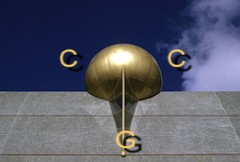 |
| Former Nigerian Vice-President Atiku Abubakar |
By John Alechenu and Ade Adesomoju
A former Vice-President, Alhaji Atiku Abubakar, has formally declared his intention to contest the 2015 Presidential election on the platform of the All Progressives Congress.
Abubakar, at a ceremony held at the Yar'Adua Centre in Abuja on Wednesday, explained that his desire to become President was born out of the need to give back to the nation.
Imo State Governor Rochas Okorocha and the Publisher of Leadership, Sam Nda-Isaiah, had also declared interest in the APC presidential ticket.
A former Head of State and National Leader of the APC, Maj. Gen. Muhammadu Buhari (retd.); Edo State Governor, Adams Oshiomhole, and Governor of Kano State, Rabiu Kwankwaso, have been reported to also have interest in the ticket.
A confident Abubakar told his supporters during the ceremony that he had the capacity to bring people together and turn things around for the better in the country.
He pointed out that the glaring mismatch between "our potential and our achievements provides a golden opportunity" for him to lead Nigerians to rekindle their innovative instinct and turn the Nigerian dream into a reality.
He explained that in spite of many challenges faced by Nigerians, they had refused to give up on the country.
The former Vice-President said the 2015 elections were about Nigerian youths and the nation's future.
He stressed that the nation, under the current administration, had failed to provide the required environment for the youth to reach their full potential.
The former vice-president said, "It is inspiring that despite difficulties and growing anxiety over the future of our country, our people have refused to succumb to despair and hopelessness.
"This never-say-die attitude gives me immense hope and it is one of the reasons why I can never give up on Nigeria."
Reacting to the agitation for generational shift, he said his generation owed younger Nigerians the responsibility of offering its political shoulders to them to climb upon.
This, he said, was necessary to improve their vision and expand their horizon.
He noted that it was this trans-generational collaboration and partnership that represented the best model to create the future that the nation desired and deserved.
Nigeria, he said, should never again be subjected to leadership experimentation or learning on the job.
He recalled that the Olusegun Obasanjo administration which he was a part of successfully reformed some critical sectors of the economy such as telecommunications and the capital market.
Abubakar said, "As Vice-President from 1999 to 2007, I worked closely with my boss, Chief Olusegun Obasanjo, who is a passionate defender of Nigerian unity.
"We focused on macro-economic stability and transforming critical areas such as banking, insurance, oil and gas, telecommunications, pension and the civil service.
"We created institutions that should lay the foundation for good governance and accountability such as the Bureau of Public Procurement, the Economic and Financial Crimes Commission, SERVICOM, whose golden rule is 'Serve others as you would like to be served.' Sadly, most of these institutions are now mere shadows of themselves."
He said the Obasanjo administration was able to deliver because it had vision, commitment and dedication.
The former Vice-President expressed sadness that rather than pay down the nation's debts, "our borrowing has been on the increase even at a time the price of oil has consistently been above $100 per barrel since the inception of the Goodluck Jonathan administration.''
He argued that resentment, disillusionment and hopelessness were the factors on which insecurity and disharmony thrived.
Nigeria, he said, was more divided today than at any other time since the civil war, adding that there was a disturbing rise in ethnic nationalism and religious bigotry because "we have a governance deficit."
The aspirant said, "Our country seems to be on auto pilot with no one in charge. Nigeria now more than ever before, needs a strong, dynamic, decisive, competent and visionary leadership that can halt the current drift of the ship of state. Corruption needs to be fought, jobs need to be created, our infrastructure needs to be rebuilt, social services need to be provided and insecurity needs to be tackled in a decisive, robust and multi-pronged way."
While commending the leadership of the APC for adopting the modified open primaries in selecting its flag bearers at all levels, Abubakar said the party remained the most potent political force to end years of PDP's dominance of the political space.
The leader of the National Assembly caucus of the APC, Senator George Akume, who spoke on behalf of other party leaders at the event, said the APC has within its ranks, the men and women who have what it takes to rebuild Nigeria.




















